National Taiwan University (NTU) professor Kuan Chung-ming (管中閔) took office as the university’s president at a ceremony yesterday amid lingering concerns over his controversial election.
Kuan thanked faculty, students and others for “supporting university autonomy” and “making the inauguration ceremony possible,” but did not comment on the controversy that delayed his inauguration for nearly a year.
While many people would think the position represents the peak of his career, he considered it an “opportunity to repay my debt to NTU,” Kuan said.

Photo: Liu Hsin-de, Taipei Times
Reiterating his vision for the university, he said that his priorities are enhancing its global competitiveness and promoting innovation, adding that he would do his best to collaborate with faculty and students to build “a brighter future” for the university.
Kuan was on Jan. 5 last year elected NTU president and was originally scheduled to take office the next month, but the Ministry of Education in April refused to appoint him, citing an alleged conflict of interest, as Kuan was an independent director on Taiwan Mobile’s board and company vice president Richard Tsai (蔡明興) sat on the university’s election committee.
It also found that Kuan had been on the company’s board and a member of its salary committee before the university approved his application to take up the positions.
The ministry ordered a new election, but the university refused to comply, saying that the order lacked legal basis.
On Dec. 24, then-minister of education Yeh Jiunn-rong (葉俊榮), who took office in July last year after two education ministers stepped down over the controversy, approved Kuan’s appointment, but requested that the university submit within three months a review of the controversies and propose solutions.
“With regard to some issues that arose during the presidential election, we hope the university would be open to different opinions and make improvements,” said Deputy Minister of Education Lin Teng-chiao (林騰蛟), who presided over the ceremony.
He also expressed the hope that as president, Kuan would work on communicating with faculty and students with different opinions and clarify public concerns in a timely manner.
The ceremony was attended by hundreds of people, including faculty, students, alumni and journalists, who filled the venue about an hour before the ceremony began.
About 200 police officers were deployed to maintain order, but the only protester was a professor who shouted “shame“ and gave a thumb-down sign when Kuan appeared on stage.
Although Kuan has been formally sworn in, his presidency remains uncertain due to a number of factors.
NTU professor Wu Ruey-beei (吳瑞北), who ran for president alongside Kuan, in September filed an administrative lawsuit against the ministry and NTU, requesting that the university repeat the election as there had been a potential conflict of interest in the election process.
The first court hearing is scheduled for Jan. 29.
Wu on Monday also appealed a Taipei High Administrative Court ruling that Kuan’s inauguration should not be postponed until the lawsuit reached a conclusion.
Kuan is under investigation for allegedly illegally working part-time for a magazine while serving as a minister without portfolio. If found guilty, he could be impeached by the Control Yuan.
Additional reporting by Wu Po-hsuan

Taiwan is stepping up plans to create self-sufficient supply chains for combat drones and increase foreign orders from the US to counter China’s numerical superiority, a defense official said on Saturday. Commenting on condition of anonymity, the official said the nation’s armed forces are in agreement with US Admiral Samuel Paparo’s assessment that Taiwan’s military must be prepared to turn the nation’s waters into a “hellscape” for the Chinese People’s Liberation Army (PLA). Paparo, the commander of the US Indo-Pacific Command, reiterated the concept during a Congressional hearing in Washington on Wednesday. He first coined the term in a security conference last

A magnitude 4.3 earthquake struck eastern Taiwan's Hualien County at 8:31am today, according to the Central Weather Administration (CWA). The epicenter of the temblor was located in Hualien County, about 70.3 kilometers south southwest of Hualien County Hall, at a depth of 23.2km, according to the administration. There were no immediate reports of damage resulting from the quake. The earthquake's intensity, which gauges the actual effect of a temblor, was highest in Taitung County, where it measured 3 on Taiwan's 7-tier intensity scale. The quake also measured an intensity of 2 in Hualien and Nantou counties, the CWA said.

The Overseas Community Affairs Council (OCAC) yesterday announced a fundraising campaign to support survivors of the magnitude 7.7 earthquake that struck Myanmar on March 28, with two prayer events scheduled in Taipei and Taichung later this week. “While initial rescue operations have concluded [in Myanmar], many survivors are now facing increasingly difficult living conditions,” OCAC Minister Hsu Chia-ching (徐佳青) told a news conference in Taipei. The fundraising campaign, which runs through May 31, is focused on supporting the reconstruction of damaged overseas compatriot schools, assisting students from Myanmar in Taiwan, and providing essential items, such as drinking water, food and medical supplies,

Prosecutors today declined to say who was questioned regarding alleged forgery on petitions to recall Democratic Progressive Party (DPP) legislators, after Chinese-language media earlier reported that members of the Chinese Nationalist Party (KMT) Youth League were brought in for questioning. The Ministry of Justice Investigation Bureau confirmed that two people had been questioned, but did not disclose any further information about the ongoing investigation. KMT Youth League members Lee Hsiao-liang (李孝亮) and Liu Szu-yin (劉思吟) — who are leading the effort to recall DPP caucus chief executive Rosalia Wu (吳思瑤) and Legislator Wu Pei-yi (吳沛憶) — both posted on Facebook saying: “I